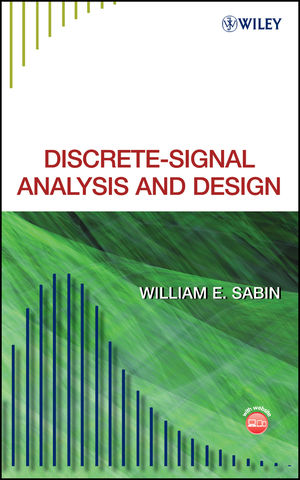Discrete-Signal Analysis and DesignISBN: 978-0-470-18777-7
Hardcover
192 pages
February 2008
 This is a Print-on-Demand title. It will be printed specifically to fill your order. Please allow an additional 10-15 days delivery time. The book is not returnable.
|
||||||
Preface xi
Introduction 1
Goals of the Book
Discrete Signals
Advantages of Discrete-Signal Analysis and Design
DFT and IDFT
Mathcad Program
MATLAB and Less Expensive Approaches
Multisim Program from National Instruments Co.
Mathtype Program
LabVIEW
Search Engines
Personal Productivity Software Capability
1 First Principles 9
Sequence Structure in the Time and Frequency Domains
Two-Sided Time and Frequency
Discrete Fourier Transform
Inverse Discrete Fourier Transform
Frequency and Time Scaling
Number of Samples
Complex Frequency-Domain Sequences
x(n) Versus Time and X(k) Versus Frequency
2 Sine, Cosine, and θ 27
One-Sided Sequences
Combinations of Two-Sided Phasors
Time and Spectrum Transformations
Transforming Two-Sided Phasor Sequences into One-Sided Sine, Cosine, θ
Example 2-1: Nonlinear Amplifier Distortion and Square Law Modulator
Example 2-2: Analysis of the Ramp Function
3 Spectral Leakage and Aliasing 43
Spectral Leakage. Noninteger Values of Time x(n) and Frequency X(k)
Example 3-1: Frequency Scaling to Reduce Leakage Aliasing in the Frequency Domain
Example 3-2: Analysis of Frequency-Domain Aliasing Aliasing in the Time Domain
4 Smoothing and Windowing 61
Smoothing the Rectangular Window, Without Noise and with Noise
Smoothed Sequences Near the Beginning and End
Rectangular Window
Hamming Window
Hanning (Hann) Window
Relative Merits of the Three Windows
Scaling the Windows
5 Multiplication and Convolution 77
Sequence Multiplication
Polynomial Multiplication
Convolution
Discrete Convolution Basic Equation
Relating Convolution to Polynomial Multiplication
“Fold and Slide” Concept
Circular Discrete Convolution (Try to Avoid)
Sequence Time and Phase Shift
DFT and IDFT of Discrete Convolution
Fig. 5-6. Compare Convolution and Multiplication
Deconvolution
6 Probability and Correlation 95
Properties of a Discrete Sequence
Expected Value of x(n)
Include Some Additive Noise
Envelope Detection of Noisy Sequence
Average Power of Noiseless Sequence
Power of Noisy Sequence
Sequence Averaging
Variance
Gaussian (Normal) Distribution
Cumulative Distribution
Correlation and Covariance
Autocorrelation
Cross-Correlation
Autocovariance
Cross-Covariance
Correlation Coefficient
7 The Power Spectrum 113
Finding the Power Spectrum
Two-Sided Phasor Spectrum, One-Sided Power Spectrum
Example 7-1: The Use of Eq. (7-2)
Random Gaussian Noise Spectrum
Measuring the Power Spectrum
Spectrum Analyzer Example
Wiener-Khintchine Theorem
System Power Transfer
Cross Power Spectrum
Example of Calculating Phase Noise
8 The Hilbert Transform 129
The Perfect Hilbert Transformer
Example of a Hilbert Transform of an Almost-Square Wave
Smoothing of the Example
Peaks in Hilbert of Square Wave
Mathematics of the Hilbert Transform
Analytic Signal
Example 8-2: Construction of Analytic Signal
Single-Sideband RF Signals
SSB Design
Basic All-Pass Network
−90◦ Cascaded Phase Shift Audio Network
Why the −90◦ Network Is Not Equivalent to a Hilbert Transformer
Phasing Method SSB Transmitter Filter Method SSB Transmitter
Phasing Method SSB Receiver
Filter Method SSB Receiver
Appendix: Additional Discrete-Signal Analysis and Design Information 153
Discrete Derivative
State-Variable Solutions
Using the Discrete Derivative to Solve a Time Domain Discrete Differential Equation
Glossary 163
Index 171



